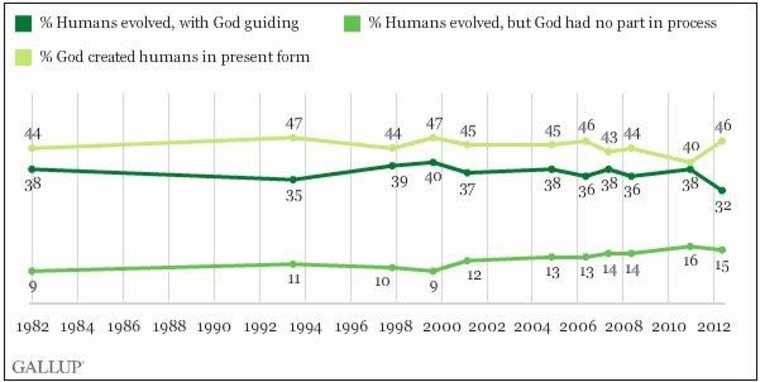Gallup released the results of a new national poll this morning on science, and unfortunately, modern biology didn't fare well: "Forty-six percent of Americans believe in the creationist view that God created humans in their present form at one time within the last 10,000 years."
There are all kinds of relevant crosstabs, most of which aren't surprising -- the more politically conservative you are, the more likely you are to believe the creationist argument. The more educated you are, the more likely you are to accept evolution.
But even if we put all of that aside, I tend to consider the same question when reports like these are published: does scientific literacy within the American mainstream really matter? At first blush, it's tempting to think that if millions of Americans choose to be wrong about science, it doesn't seem especially consequential. In our daily lives, it's an issue that doesn't often arise.
There is, however, reason for concern, and it ties into a larger context about the public's understanding of and appreciation for the scientific basics: if the United States continues to fall behind other nations in science education, our future dims.
The country just can't afford confusion on a grand scale about scientific basics -- not just about biology, but also in areas like climate science. When activists, mainly on the right, launch anti-science initiatives, such as changing school curricula, there are real and broad consequences in the long term to public confusion.
The competitive edge the United States used to enjoy is vanishing. The country needs to start taking science seriously again -- our economy depends on it -- and ignorance costs far too much. Results such as the new Gallup poll on biology should serve as a wake-up call.
Neil deGrasse Tyson gave a lecture a few years ago that stuck with me on the "philosophy of ignorance," in which he said a lack of appreciation for basic scientific principles will hurt America's scientific output, which has traditionally been the nation's largest economic engine.
"If nonscience works its way into the science classroom, it marks ... the beginning of the end of the economic strength this country has known," Tyson said.
To care about American economic competitiveness is to care about science.
